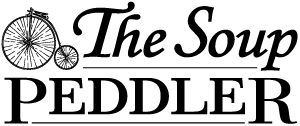Soup Peddler Goes To Canada
R&D in the Summertime July 15, 2005
When one comes home from a long day at the springs and feels a good, well-earned hunger start to dig its claws into the belly, it is indeed dinnertime. If, perchance, the pantry yields nothing terribly appealing, then it's time to look elsewhere for assistance.
Most commonly, in this circumstance, the suggestion, "Shall we go out for Mexican?" is heard. Or, "Shall we go out for Italian/Chinese?" Or, perhaps less frequently, "Shall we go out for Middle Eastern/Persian/Greek/Vietnamese?" But have you ever, in your life, heard someone say, "Shall we go out for Canadian?"
In this entry, we'll examine exactly why that is. To fill you in on some details, Canada is a vast, snowy wasteland positioned just north of the United States. To give you some idea of its size, it is bigger than Texas. Canadians are remarkably easy to make fun of.
I and my new bride, Meredith Lynn Ansel, traveled to Canada for our honeymoon, not in search of gastronomical adventure, but primarily as an escape from the depths of the Austin summer. We wanted to frolic in places like this:

Alas, our visit to sunny Tofino ended up being a little bit more of a waterlogged affair:

My impression was that we were heading to a sun-soaked, azure-watered paradise. In retrospect, I guess that's what one can expect by believing the promotional literature from a tourist bureau located in a temperate rainforest. The Eskimos have something like thirty different words for snow, and I believe the Himwitsa must have a similar amount of expressions for rain, since after only four short days, Meredith and I began to weary of using that same boring word to describe the weather outside.
"It's kind of rat-a-tat-tatting now," she said, looking out the picture window towards where our waterfront view was supposed to be.
"Mmm," I said, "With all due respect, I beg to differ. I'm getting more of a tic-tic-tic-a-tic-tic sound." We sounded as if we were trying to describe our cars' sounds to Click and Clack. We consulted the weather station again, and the weatherpeople in Tofino in summer have just about as boring jobs as the weatherpeople in Austin in summer. One literally shrugged, smiled, and said, "Well, you know."
"This is not honeymoon country, this is soup country," observed Meredith. "You brought me here just so you would have an excuse to eat soup. I should know better, David Ansel. This happens every time," she said, slapping her knee dramatically.
"Now that you mention it, a little nip of soup might do the trick. Great idea. What say we strap on the old raingear and head into the village for a sip?" We trundled on down to the one-horse town that is Tofino and tucked into yet another bowl of wonton soup, the fourth of the trip.
She was onto me, and my secret and quite ambitious plan for a double-pronged soup exploration was now out in the open. The Pacific Northwest (or Pacific Southwest, as it must be known to Canadians) is rife with Chinese restaurants and, one suspects, a great proliferation of chowder houses. After all, in the simple arithmetic of soupmaking (soupmetic), MISERABLE WEATHER + FISH = CHOWDER. It is a simplification, but for the purposes of our discussion, let us go with that. Additionally, CHINESE + RESTAURANT = WONTON. With those postulates in mind, we set to work.
"Obviously, a stovetop stockpot, fresh made today," I said, picking up my spoon. Globules of chicken fat floated on the top of the pot, indicating that the stock had never been refrigerated and defatted, nor was it decanted from a bottom-mounted valved stockpot or kettle. My mind flashed back to the wonton soup we had in Victoria, only days before. It was light and clear, and tasted like a mix of fish and chicken stock, with an ephemeral, aspartamey sweetness like steamed artichokes sometimes have. "Straightforward chicken stock," I said, sipping.
The wonton wrappers used out West, without fail, are paper-thin, like those used around dim sum dumplings and not like the thick ones that I grew up with back East. How does this regional pattern develop? Are all these West Coast Chinese soupmakers in cahoots? Perhaps there's a mob organization back East that strong-arms all of the restaurants to use their cousin's thick wonton wrappers. But to think that they'd have the gumption to deny an entire half of the country the delight of thin wonton wrappers for the sake of their own personal gain was troubling and led to no small amount of dyspepsia. "This is a complicated world we live in," I said to Meredith at the conclusion of the bowl.
When the waitress dropped off the check, I asked where we might be able to get some good Canadian food around here. She looked at me sideways and excused herself. The rain slackened a bit, and M suggested a walk through town. The following sign caught our eye:

Despite the obvious carelessness with respect to scale and accuracy (only black bears are to be seen in the area), we decided to give it a go. A bear watch, for those of you who are unaware, is a boat ride through the protected sound during low tide, when all the bears come out for lunch. They lumber down below the tide line and turn over rocks in search of crabs and other goodies.
When we got down to our embarcation point, the Tofino public pier, I noticed this thing:
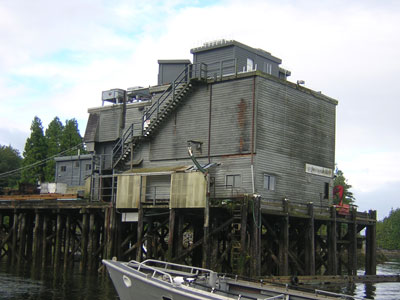
It looks a lot like Hudson's Deer Processing on South Congress, and I put two and two together (more soupmetic) and realized it was a fish processing plant. I also noted that I had never seen one at any place called "Fisherman's Wharf." Because when something is called "Fisherman's Wharf," it's not for fisherman, it's for tourists like you and me. Fishermen know when a wharf is meant for them, and it doesn't need to be named "Fisherman's Wharf" for them to know that that's where they should go to find their boats and be jolly fishermen. This is a real Fisherman's Wharf, I realized, and that's where the real fish really go out of the boat onto land, and that's what the little crane is really for.
Moving on, we boarded the bear-watching boat and set out into the glassy islet-pocked waters of the Clayoquot Sound. Ah, here was the intimate grace we had been seeking; the feminine curves of the fjords, the estuarine spray, the stippled evergreens upon the hills, the breeze in your face that only a wide-open 250-horsepower Evinrude can produce! Yeah!
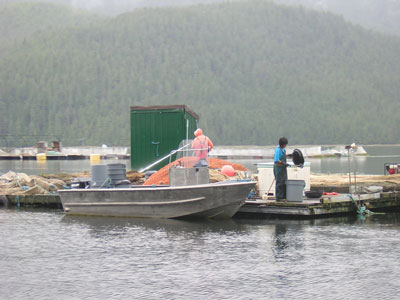
We soon came to this sort of floating village and I asked our captain what it was. "Farm," he said. It was one of his more verbose moments during the course of the trip. So this was one of the evil fish farms I'd heard so much about! This is why we get salmon for three or four bucks a pound. Certainly seemed benign enough from up here.
It set me to thinking pretty hard about all the choices we make as consumers. The main downside to the fish farm is that there is a bit of a human health toll there... the pesticides and antibiotics are a result of the close quarters for the little fishies. Solution? Eat wild fish (if you're rich enough). Problem: we can't feed the world on wild fisheries, period. My fish man himself (the one featured in Slow and Difficult Soups) told me, though his opinion was obviously unpopular amongst his peers, "We need a five year moratorium on all wild fisheries, just to give them some time to rebound." So the choice here is, in a sense, your health vs. the planet's. There really isn't a great option, except to not eat fish at all.
Nah.
Besides, that flabby, couch potato farmed salmon is just so much more tender and fattylicious than the wild stuff. The wild ones lead way too active lives. Put in different terms, if you were a cannibal, would YOU want to eat marathon runners? No way, too sinewy. You'd need to braise them for a really long time.
In the end, we did get to see lots of bears crunching on crabs and teaching their cubs how to do the same, and it was all extremely cute and so forth. We made it back to town. All that seafaring made me hungry for some chowder.
"I'm hungry for some chowder," I said to Meredith.
"Didn't we just eat?" she said.
"Yes, but..."
"And aren't you on a cold streak with regards to chowder on this trip?"
It was true. I was on a cold streak, and a soupmaker doesn't like to be on a chowder cold streak. My thoughts flashed to the utter embarrassment I felt over the chowder we had on Orcas Island--nothing more than a bucket of hot buttered milk with a few rubbery bits of bacon fat. My sensibilities were offended so badly that Meredith had to bodily help me out of the restaurant. We supped the following evening at a much nicer establishment, a sort of Nouveau Canadian tapas type place. Nice. Cloth napkins, waterfront view, lively staff, and an excellent font choice on the menu. I felt redemption would soon be at hand and confidently ordered the chowder. What I got was light years better, but for the Love of G-d, it was a puree! It was creamy and salty, yes, but I could've been eating cream of asparagus for all I could tell. And then, and THEN, the absolute worst chowder encounter of the trip was on Granville Island in Vancouver. I must find the means to gird my soul before endeavoring to tell this tale. Please excuse me for a moment.
Thank you. The worst chowder encounter took place in the lovely market on the island. Everything was just lovely. We tasted delicious smoked and candied salmon, we eyed plentiful and luscious blueberries. I was feeling good. We turned the corner and found just the cutest soup stand, with a big steam-jacketed kettle full of chicken carcasses and leek trimmings on display at the front. I rubbed my hands together and said, "Babe, this is it," then turning to the cashier and holding up one finger, "The chowder, please." We adjourned to the piazza and I began to dig in.

First, my palate was basically given the finger by the profusion of dill in the soup. Secondly, once I had recovered enough to have another opinion, my soul was bitch-slapped by the complete absence of fish stock. Meredith addressed me with a worried look, and instinctively knew that this was one of those times where it was just best to give me some space.
Soon enough, we tired of the weather in Tofino and turned our rental car back towards Vancouver. We passed this tree:
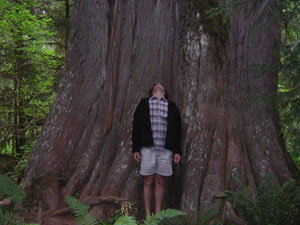
The skies cleared and the great city loomed as our ferry pulled gently into port. What a delightful place! Certainly makes a comfortable home for this decade's conscientious objectors. We immediately hit the streets.
"Babe, this is our chance to finally nail down a great wonton soup and take this thing to the hoop, so to speak," I said. Vancouver is a very Asian-Canadian city, and I felt an alignment of The Force, that the universe was conspiring to produce me a memorable end to the wonton soup quest. We prepared the palate with the greatest lemon (or any) cupcake I've ever had:

and continued on, looking for the most promising Chinese food establishment. We drove to Chinatown, of course, but it was shuttered and desolate, completely locked down with nary a soul in sight. We headed back into downtown and soon enough, a neon sign beckoned unmistakeably--the culinary equivalent of banking left and seeing those runway lights line up to bring you in for a landing.
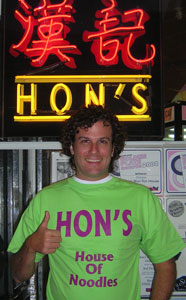
Hon's, to speak conservatively, is the terrestrial Valhalla of Chinese food. Good Lord Almighty, bless you for the Grand Design that allowed this restaurant, with all its septillions of atomic particles, to align and exist in my universe. We walked in and were immediately dwarfed by the titanic scale of the restaurant. The cafeteria was twenty ranks deep by a hundred wide of identical tables and chairs. You could have fed Alexander's Eighth Army in one sitting and still had room left over for all the members of Parliament-Funkadelic. A swarm of neon-shirted waitstaff attended to the diners with all the frenetic energy of combat nurses in triage. The entire kitchen was exposed to the dining room and no less than three dozen chefs manned woks under at least a hundred linear feet of stainless steel vent hood. Just a rough calculation on the natural gas BTUs alone were enough to make this soupmaker's head spin. The wonton soup came out and it was fine, I think, but I was so utterly overloaded with glee over the magnitude and cheery coordination of the establishment that they could've served me day-old sea cucumber congee and I wouldn't have noticed a bit.
Phew. Meredith spotted me carefully as I tottered out onto the street in a soup-induced fog, then steered me into the passenger seat for our return trip to the Land of the Free, Seattle in particular.
"Thith ith our latht chanthe," I slurred, hiccupping, slumped against the passenger door.
"Please speak clearly, I can't understand you," Meredith said.
I eventually made clear that Seattle was the last chance in the trip to resolve our sad fate regarding fish chowder. I reminded her that MISERABLE WEATHER + FISH = GREAT CHOWDER, and the region was doing its best to disprove my corollary.
The following day, we made our way through spitting rain to Pike Place Market, of course, home of the fish-throwers and other lovely edibles. If this was not the answer to our chowder question, then I would simply have to write off the entire western half of the United States as chowder country.
Luckily, we found our way to a proper market stall, with a chalkboard menu and two banged up, charred soup pots on the range.
"It's on," I said, speeding up my pace to the counter. Meredith, with her short legs, fell behind and was second to arrive.

It was righteous, and it was worth the wait. Chunky, creamy, salty, peppery, fishy, savory. I finished my bowl and forced my way back to the counter.
"Are you the guy who made the soup?" I asked.
"Sure am," said the soupmaker.
I proffered my hand and said, "I'm the Soup Peddler from Austin, Texas, and this is some damn good chowder. You're a great soupmaker. Can I take your picture?"
I didn't even have to advise him on how to pose. He stood over by his pot, lifted his ladle, index finger knuckle instinctively tucked under the bend in the handle, and gave me that "You want some of this?" look. Click.

Have a nice rest of the summer. We'll be back in soupmaking action shortly.
